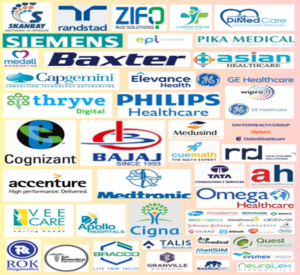Department of Biomedical Engineering

















Undergraduate Program
B.Tech – Biomedical Engineering
Duration – 4 Years
Established in 2020, The department offers a world-class setting for cross-disciplinary biomedical engineering research and collaborate with medical experts to create technologies that enhance and save lives by fusing a wide range of engineering disciplines with human biology and medicine. The Institute’s primary research goals are to create innovative medical devices, systems, and technologies that can significantly improve healthcare, as well as to use new engineering technologies in clinical settings. (e.g., prosthetic devices, imaging systems, and biopharmaceuticals).
Biomedical engineering has made previously unthinkable advancements such as cochlear implants, heart pacemakers, MRI scanners, hip and knee replacements, laser surgery, and prosthetic organs—innovations that are practically universal—a reality.
Orthopaedic, cardiovascular, and drug delivery systems are among the implantable medical devices created and produced by biomedical engineers. Some of the most current breakthroughs they have introduced to the globe in recent years include bionic organs, robotic limbs, heart support pumps, and heart valves implanted via minimally invasive day surgeries.
Some biomedical engineers work on cutting-edge technologies like tissues and organs that can be created through tissue engineering, or they enhance the designs of therapeutic equipment like bionic limbs for the injured and individuals with disabilities. External medical tools that aid in diagnosis and treatment include augmented reality gadgets, medical imaging equipment, and data-driven solutions like e-medicine.

The Bachelor of Engineering (Biomedical) programme at our university should be your top choice for a number of reasons.
Job prospects for biomedical engineers are numerous and include working as a clinical engineer at a hospital, designing medical products for industry, working in technical sales, and working as staff engineers in medical research labs. A wide range of specialties exist for biomedical engineers, some of which may be based on medical conditions like cancer, organ systems like the heart, or technological advancements like biomaterials or imaging. The following applications and abilities may be used in the work of a biomedical engineer:
Artificial organs – (e.g. valves, pacemakers) | Create software for a cardiac pacemaker that can recognise aberrant heart rhythms. Create a sophisticated coding/stimulation system implant. |
Prosthetics – (e.g. dentures, artificial limb replacements) | Utilise cutting-edge materials and mechanical design considerations to create the next generation of hip implants. |
Monitoring systems | To treat a chronic illness that calls for consistent blood levels of a certain medication, research and perfect an innovative drug delivery technique. |
Drug Delivery System | Bring a product to market through the complex pre-market approval procedure regulated by the Food and Drug Administration, which calls for rigorous clinical testing. |
Imaging methods – (e.g. ultrasound, X-ray, particle beams, MRI) | Improve one of the various contemporary imaging modalities (PET, MRI, CAT scans), either by the introduction of new technologies or the advancement of existing ones. |
Therapeutic devices – (e.g. insulin pumps, kidney dialysis, electrical nerve stimulation, sophisticated inhalers) | Create the proper enabling technology by analysing a patient’s unique communication or mobility needs. |
Surgical devices and systems – (e.g. laser surgery, robotics) | Create the proper enabling technology by analysing a patient’s unique communication or mobility needs. |

BEST PRACTICES |
Model Demonstration, video presentations |
Hospital visits to enhance understanding of anatomy and physiology of the human body |
Test of the analog/digital circuits using National Instrument’s Multisim software |
Study of surgical/therapeutic and first aid procedures through medical simulation |
Live demonstration of portable handheld equipment in the classroom |


TMI Medical Systems, Bengaluru

Atheena Pandiyan Private Limited, Chennai
![]()


OUR RECRUITERS

Undergraduate Program
B.Tech – Biomedical Engineering
Duration – 4 Years
About the Department
The Department of Biomedical Engineering was started in the year 2020 in Ramapuram campus. Biomedical Engineering involves the study and application of engineering processes for diagnosis and therapy. It is a rapidly changing interdisciplinary domain, in which each branch of engineering interacts with several other disciplines to yield a fundamental understanding of health maintenance processes and improved diagnosis, optimal interventional (surgical, therapeutic & rehabilitative) procedures, prosthesis and organ assist systems, health care systems performance, and econometrics. It constitutes human beings’ earliest efforts to understand the living world in terms of basic sciences and to comprehend body mechanisms in terms of their technological creations.
Biomedical Engineering is the amalgamation of engineering principles and medical procedures in order to create solutions for healthcare. This essentially involves collaborating with Medical practitioners and researchers in the domain, to develop medical equipments and devices as well as computer systems and software solutions related to the field. The department faculty members are expertise in areas such as Biosignal and medical image processing, Rehabilitation Engineering, Biomedical instrumentation, and so on.
| BEST PRACTICES |
|---|
| Model Demonstration, video presentations |
| Hospital visits to enhance understanding of anatomy and physiology of the human body |
| Test of the analog/digital circuits using National Instrument’s Multisim software |
| Study of surgical/therapeutic and first aid procedures through medical simulation |
| Live demonstration of portable handheld equipment in the classroom |
Core area in Biomedical Engineering